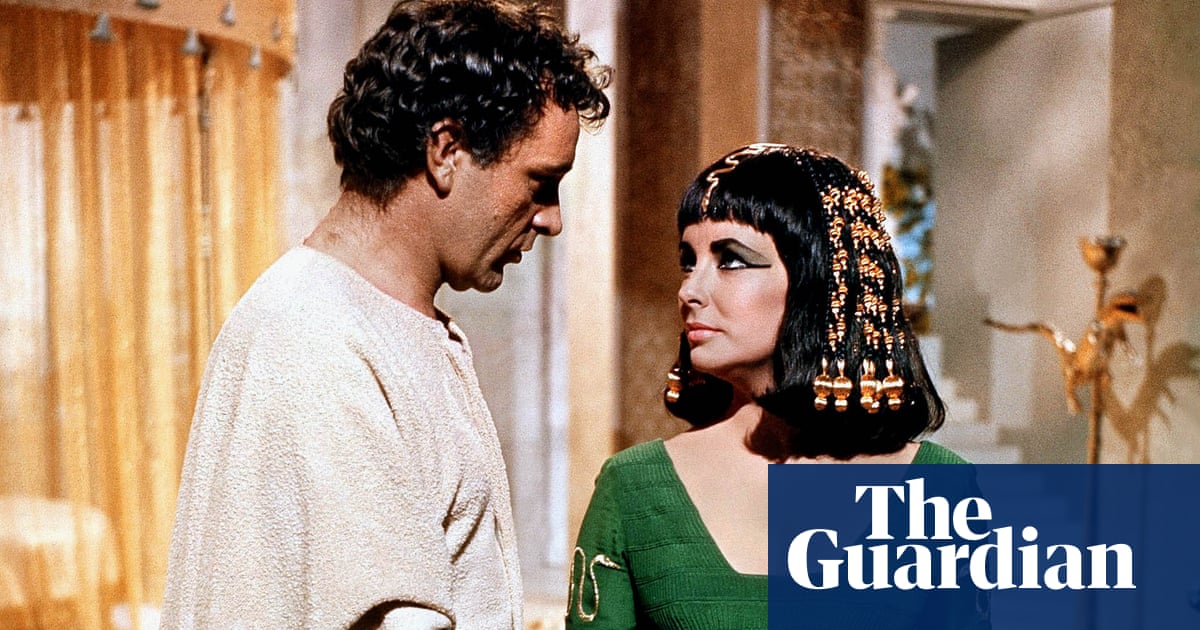
As I prepared to write on the 60th anniversary of Cleopatra, I asked a few friends and relatives if they had ever seen it. Some had, but more hadn’t: life, even or perhaps especially for the well-versed cinephile, is short, and four-hour-plus Hollywood follies with steadily mouldering reputations quite reasonably aren’t high on everyone’s catch-up list. But more than one person told me that they weren’t actually sure: “I definitely feel like I have,” said one film writer, citing the reams of well-publicised lore on its tortured production and imposing industry legacy, the popularly cemented visual iconography of Elizabeth Taylor’s lavishly eyelinered Egyptian queen, and the film’s status as the origin of the most glamorously turbulent romance in showbiz history. “But have I actually watched the whole thing? If so, I’ve forgotten all the connecting tissue between its most famous images.”
It was a response that to me captured the odd cultural status of a film that is at once a vast Hollywood behemoth and a dust-gathering curio, one that pretty much everybody knows something about, but precious few who weren’t alive for its noisy initial release have seen. I explicitly remember seeing it as a teenager, because doing so required some complicated VHS-era organisation: when it was broadcast at an inconveniently late hour on South African TV, I watched the first half-hour so the rest could fit on to a four-hour video cassette, and then dutifully trudged through it in instalments.
For years afterward, I maintained that the film was significantly better than its musty reputation – though perhaps at some level I was simply justifying to myself the time and effort spent on watching the damn thing. And like my uncertain colleague, whether he had seen it or not, I too formed few memories of the dramatic specifics on either side of its most extravagant set pieces. Revisiting it last week, it was clear enough why. Scripted, often quite literately but most inconsistently, by a hotchpotch of writers that included Lawrence Durrell, with eventual director Joseph L Mankiewicz finally claiming chief credit, Cleopatra rambles in a manner few blockbusters this expensive – $31.1m in 1963, over $300m adjusted for inflation – would dare today.
It’s a more loquacious film than you might guess or recall: Mankiewicz, a director whose best work (All About Eve, The Ghost and Mrs Muir, A Letter to Three Wives) thrives on smaller-scale verbal tension and sparring, has immense faith in the power of conversation and argument to enliven Roman history, and to animate the two marriages – Cleopatra’s chilly, calculated arrangement with Caesar, and her more passionate union with Mark Antony – that essentially form the film’s two vast halves. As producers shovelled money into such spangly, jaw-dropping centrepieces as Cleopatra’s arrival in Rome – an exquisitely choreographed and costumed ceremonial parade that puts certain real-world coronations to shame – you can’t help sensing that Mankiewicz would rather have made a chamber piece.
The upside of this focus on human smallness amid all the spectacle is a jagged quippiness: the chief surprise of the film, to the uninitiated, is how archly funny it is. “You dare ask the proconsul of the Roman Empire,” Antony bristles, when the queen instructs him to kneel before her. “I asked it of Caesar, I demand it of you,” she purrs in response. Later, when he professes a love for “almost all Greek things”, her comeback is as delicious as it is inevitable: “As an almost all-Greek thing myself, I’m flattered.”
Still, there’s an awful lot of hot air here, and Mankiewicz might have shed some of it by fudging a date or two. As the film lumbers rather methodically through history, beginning with Julius Caesar’s victory at Pharsalus and arrival in Egypt, winding languidly to Cleopatra’s snake-assisted death, and taking in assorted military battles and personal contretemps along the way, the film’s grasp of the facts is surprisingly solid in a genre given to radically rewriting the record. But its conscientiousness in this regard also yields a torpid evenness of pacing, a dull resistance to climax. Rest your eyes for 20 minutes at any point in the proceedings and you’ll miss a fair bit of incident, but no real gear changes, and you can carry right on. The iconoclastic Thai auteur Apichatpong Weerasethakul has long claimed his films are built to accommodate intervals of sleep; so, in its way, is Cleopatra, though perhaps less by design.
The film’s compensating pleasures, then, alongside its ripeness of dialogue and performance – Rex Harrison’s brittle, prissy Caesar landed one of the film’s somewhat grudgingly given nine Oscar nominations, and deservedly so – are entangled with its Hollywood mythos. Though the romance between Cleopatra and Antony is as sluggishly dramatised as everything else, the palpable tinderbox chemistry between Elizabeth Taylor and Richard Burton – then both married to other people – jolts the film awake; you can’t watch them together and not think of the stars’ affair and the attendant scandal, and that heat folds back into the seduction on screen. Taylor, then halfway between her two Oscars and at the zenith of her stardom, may not be the optimal screen Cleopatra, but neither can you take your eyes off her: her styling may be distinctly 60s-accented, her diction vampishly modern, but there’s a certain historical integrity to casting the untouchable queen of one realm as that of another. When Harrison’s Caesar disrupts her bathing, Taylor mutters, “Oh, it’s you,” with a diva’s withering disdain, seemingly directed as much at the galumphing production around her as anything in the world of the film itself.
That is as it should be. If Hollywood has since failed to produce another, equivalently high-profile Cleopatra biopic – even as mooted new versions and appropriate casting debates flare up every few years – that’s perhaps down to the scarcity of stars of Taylor’s magnitude, supernovas who feel both up to the job and liable to float entirely above it all. Angelina Jolie, this generation’s Taylor proxy, was floated a few years back; even that glitzy prospect failed to materialise. After all, anyone attempting a new Cleopatra has to bear the white-elephant associations that come with the very title: the 1963 film is best remembered as the film that nearly tanked 20th Century Fox, more so than its conflicting/corresponding status as the highest-grossing film of its year. To this day, Cleopatra’s reputation is caught between poles of success and failure, dazzle and dullness, prominence and obscurity: yet for now, at a time when studios will only lavish queen-size budgets on franchisable fantasy, Mankiewicz’s epic remain Hollywood’s last, very wordy, word on its fabulous subject.












